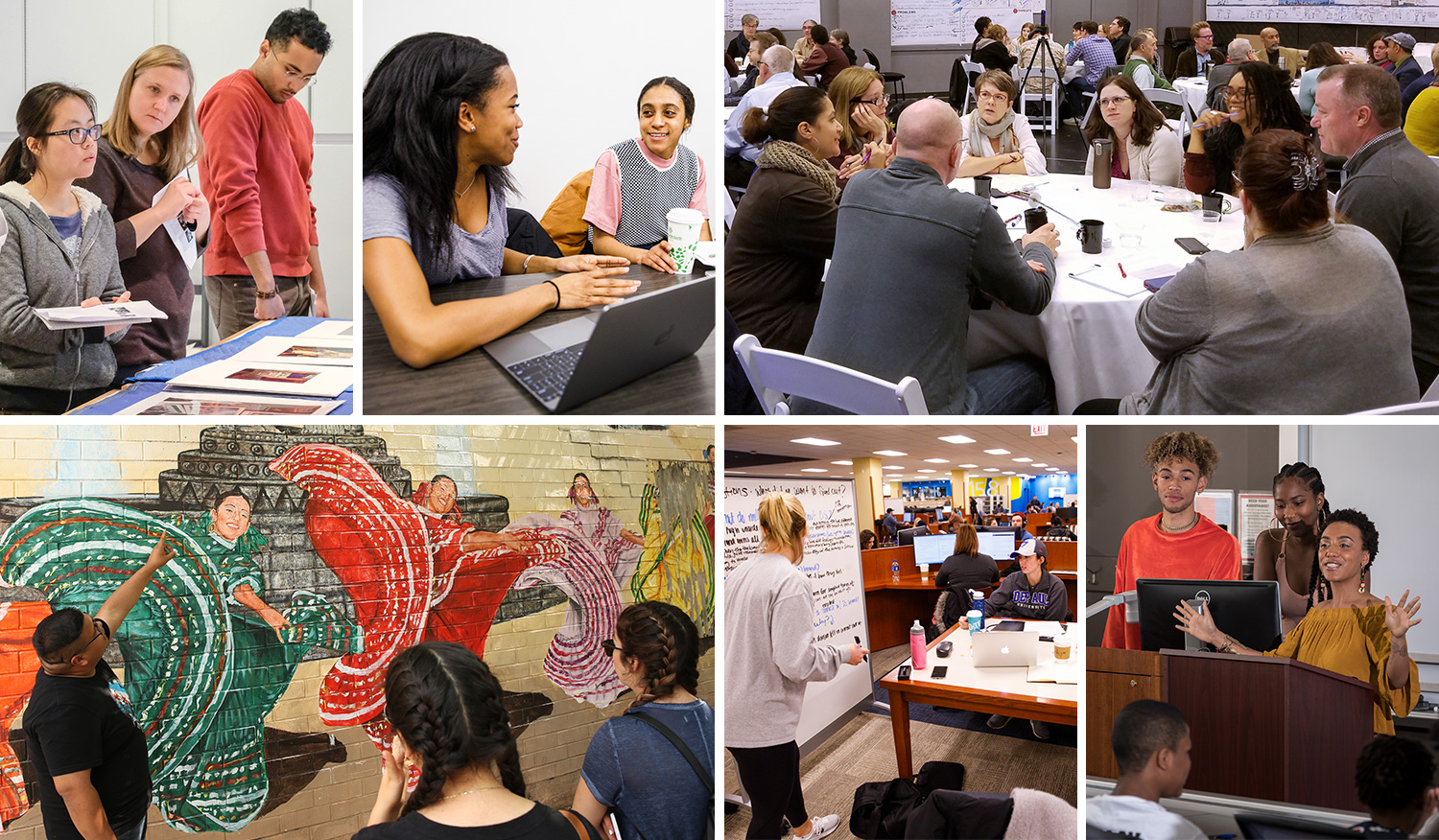 The Experiential Humanities Collaborative will bring together Chicago area community organization leaders with DePaul University faculty and students to address current day societal issues. The new initiative in DePaul’s College of Liberal Arts and Social Sciences is supported by a $750,000 grant from The Andrew W. Mellon Foundation. (Composite image by Jeff Carrion)
The Experiential Humanities Collaborative will bring together Chicago area community organization leaders with DePaul University faculty and students to address current day societal issues. The new initiative in DePaul’s College of Liberal Arts and Social Sciences is supported by a $750,000 grant from The Andrew W. Mellon Foundation. (Composite image by Jeff Carrion)CHICAGO — DePaul University has been awarded a four-year, $750,000 grant from The Andrew W. Mellon Foundation in support of a humanities initiative that will bring together faculty, Chicago area community organization leaders and students to address current day societal issues.
Known as the Experiential Humanities Collaborative, the initiative will champion the power of the humanities to make profound social impact through experiential engagement in higher education and the community.
“The humanities are rooted in the study of the human condition and the human experience, including our most profound challenges. They teach us to think critically, but also to develop the robust creativity that will be essential if we are going to develop solutions to the pressing problems facing our society,” said Margaret Storey, associate dean and professor of history at DePaul’s College of Liberal Arts and Social Sciences.
With the Mellon Foundation grant, the college will build on DePaul’s long history of community-engaged teaching by launching a team-teaching model that allows for humanities faculty, community partners and students to collaboratively design project-based courses. Each year of the collaborative will be organized around a topic of social significance, such as immigration, gentrification, mass incarceration, gun violence, youth political engagement, ethnic diversity or issues around democracy.
“Faculty in DePaul’s College of Liberal Arts and Social Sciences have long offered our students a rich array of community-based, experiential, project-based courses. The academic emphases of these courses, however, has tended to be in the social sciences,” noted Guillermo Vásquez de Velasco, dean of the college.
“Until recently, humanities courses — specifically literature, writing, history, art history, languages, ethnography, cultural studies, philosophy and religious studies — have had fewer opportunities to engage in project-based learning,” Vásquez de Velasco said. “We decided to make a strategic shift in the college with this new approach, to show that project-based humanities courses can engage with and respond to community needs, while providing valuable learning experiences for students. The collaborative will champion the humanities’ potential to tackle the most seemingly intransigent social issues.”
“Co-teaching in the humanities is relatively rare,” explained Storey. “And when it happens, it usually involves two faculty working together over a single academic term. The Mellon grant allows us the extraordinary opportunity to expand the team-teaching model to include community practitioners and students, and to extend their interdisciplinary collaboration over the course of an entire academic year. We believe this will offer the time and support necessary to create and deliver sustainable, meaningful projects for the community partner.”
Collaborative structure
After a preparatory year in which the college establishes the structures and processes necessary to run the program, implementation of the collaborative will begin in August 2020. It will be led by a faculty director and a nine-member advisory committee.
In each of the following three years, the collaborative will host three teams of five fellows: two DePaul humanities faculty fellows, a community fellow, a DePaul undergraduate student fellow and a DePaul graduate student fellow.
Each team will collaborate to develop a course in the humanities in which students will work on a project, co-designed within their team, for the benefit of the community fellows’ organizations or their constituents. The course will be taught in the spring by the two faculty fellows and the community fellow. During the summer, members of the teams will analyze and reflect on their work, and share those findings publicly.
“By structuring the collaborative to include community organization leaders as fellows alongside faculty, and as colleagues in the program, the college also will develop a new type of academic-practitioner model for these kinds of collaborations, a field-tested model that can be shared with other universities,” noted Vásquez de Velasco.
“This approach is consistent with DePaul’s foundational belief that it is embedded in the community it serves, and that students and faculty can best learn and practice in an environment that integrates a wide range, and broader definition, of academic, theoretical and experiential expertise,” said Vásquez de Velasco. “We are grateful to the Mellon Foundation for its support of this initiative that will exemplify the role that the humanities and an urban university can play in developing innovative solutions to pressing social problems.”
###
Media contact:
Carol Hughes
312-362-8592